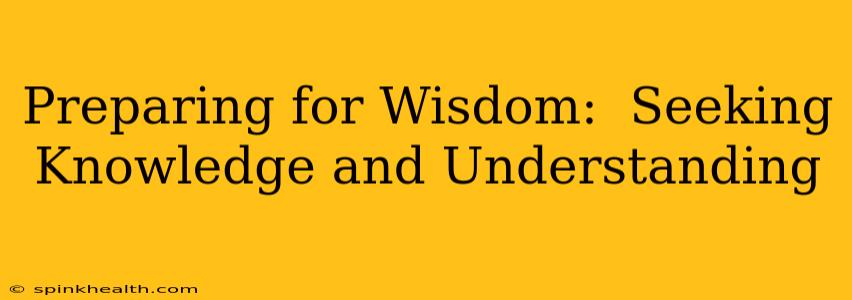The pursuit of wisdom is a lifelong journey, a quest for deeper understanding and insightful application of knowledge. It’s not merely the accumulation of facts, but the cultivation of discernment, judgment, and practical application of learning to navigate life’s complexities. Preparing for this journey requires a conscious effort to cultivate certain habits and attitudes. This article will explore key aspects of this preparation, addressing common questions along the way.
What are the first steps to seeking wisdom?
The initial steps towards seeking wisdom often involve self-reflection and a genuine desire for growth. Begin by identifying areas where you lack understanding or feel uncertain. This self-awareness is crucial. Then, actively seek out diverse sources of knowledge: books, conversations, mentors, experiences. Embrace lifelong learning as an ongoing process, not a destination. Cultivate curiosity, asking "why" and "how" frequently, and actively challenge your own assumptions. Finally, be open to changing your mind based on new evidence and perspectives.
How can I improve my understanding of complex topics?
Understanding complex topics requires a structured approach. Break down the topic into smaller, more manageable parts. Use various learning methods—visual aids, reading, discussions, and practical application—to reinforce your understanding. Find reliable sources of information, critically evaluating the credibility and bias of each source. Don’t be afraid to ask for help; discussing complex topics with others can illuminate blind spots and deepen understanding. Furthermore, actively seek out different perspectives, even those that challenge your existing views. This allows for a more holistic and nuanced understanding.
What is the difference between knowledge and wisdom?
While often used interchangeably, knowledge and wisdom differ significantly. Knowledge represents the accumulation of facts, information, and skills. It’s the "what." Wisdom, however, transcends mere knowledge; it's the application of knowledge with sound judgment and discernment. It’s the "how" and "why" behind the knowledge. Wisdom involves understanding the context, implications, and limitations of knowledge. A wise person doesn't just know facts; they understand how to use those facts effectively and ethically in different situations.
How can I cultivate wisdom in my daily life?
Cultivating wisdom in daily life requires conscious effort and mindful practice. Engage in activities that challenge your thinking and broaden your perspectives. Practice mindfulness and self-reflection, regularly assessing your actions and their consequences. Seek out diverse perspectives and engage in respectful dialogue with those who hold different views. Embrace failure as a learning opportunity, analyzing mistakes and adjusting your approach accordingly. Finally, cultivate empathy and compassion, understanding the perspectives and experiences of others.
Are there specific books or resources that can help me on this journey?
Many books and resources can guide your quest for wisdom. Classics like the works of Plato, Aristotle, and Seneca offer timeless insights into ethical living and self-improvement. Modern authors such as Daniel Kahneman (Thinking, Fast and Slow), Stephen Covey (The 7 Habits of Highly Effective People), and Nassim Nicholas Taleb (The Black Swan) provide valuable perspectives on decision-making, personal effectiveness, and navigating uncertainty. Remember to choose resources that resonate with your personal interests and learning style, and be discerning in your selection. The quality of information varies greatly, so always prioritize critical evaluation.
What role does experience play in gaining wisdom?
Experience plays a crucial role in gaining wisdom. Life's challenges, successes, and failures provide invaluable lessons that cannot be learned solely from books or lectures. Reflecting on your experiences, analyzing both positive and negative outcomes, allows you to extract valuable insights and learn from your mistakes. However, it’s important to note that experience alone isn't enough; it must be combined with critical reflection and the willingness to learn from both successes and failures.
The path to wisdom is a continuous journey of learning, reflection, and application. By actively seeking knowledge, engaging in thoughtful reflection, and embracing lifelong learning, you can cultivate wisdom and live a more meaningful and fulfilling life. Remember, the journey itself is as valuable as the destination.

